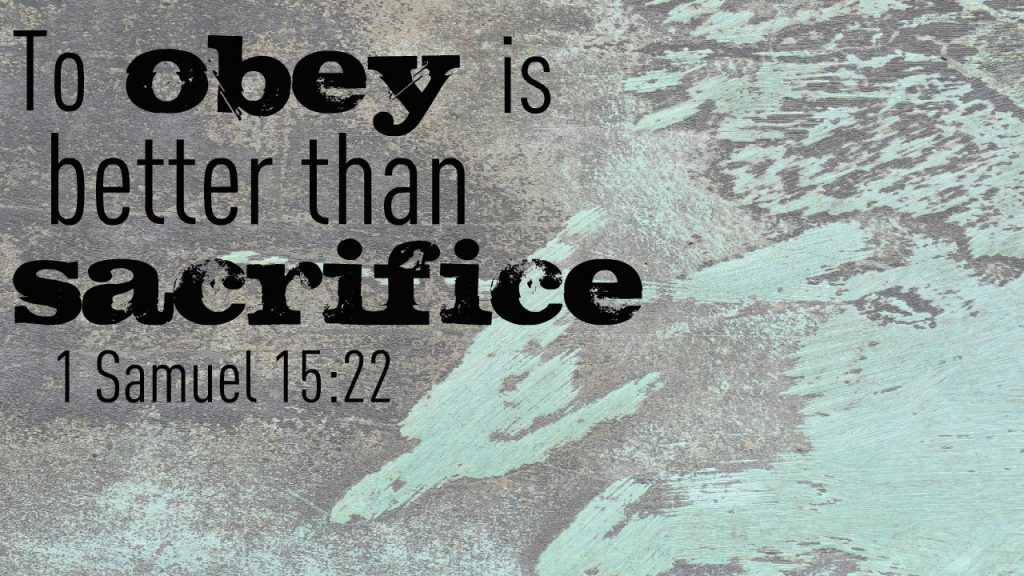
What, then, is the right answer to the above question? Christianity teaches that we are saved not by our works, but by grace. We do not plead our own efforts, but instead to plead the efforts of Jesus Christ. Were all chosen by God before we were even formed in the womb.
So, why don’t we grow up being obedient to His Word?
After all, Obedience comes with Grace. The word “grace” means an undeserved free gift. Grace is unmerited favor. Grace is receiving the opposite of what we deserve. And it is only on this basis that we can expect God to save us. This is strikingly clear in (Ephesians 2:8-9). For it is by Grace you have been saved, through faith – and this is not your own doing; it is the gift of God, not a result of works, so that no one may boast.
Are you willing to do what it takes to truly know God? Seeking to identify the middle ground between our responsibility (obedience) and God’s role in sanctification (holiness) can be challenging, but it doesn’t need to be. The Bible is filled with passages about obedience. This is why I do not embrace hyper grace, but I cherish biblical grace.
Of all the attributes of God described in the Bible, holiness is seen most often. Men fell down in the holy presence of God. Leaders, priests, and kings all trembled at the sheer magnitude of His holiness. The angels cry, “Holy, Holy, Holy is our God.” Holiness (through obedience) is the key to truly understanding God.
This is why sin is a serious thing. It separates us from God; it stands in direct opposition to Him. It corrupts our character and our testimony; it prevents holiness and quenches and grieves the Spirit within. We cannot say we Love our Lord with all of our heart and not be obedient.
That is one of the biggest things that Bible teaches us, To Be Obedient. Every man of God disobeyed Him at one point or another. We all know the story of Israel’s first King. King Saul was disobedient to what God asked him to do and God took His Grace from Him.
There are numerous stories in the Bible about removing His Grace because, of disobedience. Samson and King Solomon are other stories in the Bible. We can’t forget about Job, when God allowed Satan to torment him (Even Though He Was A Just Man). All that happened to him was because, God removed His Grace from Job.
(1 Peter 1:14) says, “As obedient children, not conforming yourselves to the former lusts, as in your ignorance.” 1 John 3:3 adds that “all who have this hope in Him purify themselves, just as He is pure.” And Romans 6:19 tells us to present our “bodies as slaves to righteousness.” Peter asks, “What sort of people ought you to be in holiness and godliness?” (2 Peter 3:11). It’s clear from Scripture that grace produces sanctification (holiness).
Holiness is a by-product of our submission to the work of the Spirit. Because of God’s grace I want to obey Him. Sadly, many don’t seek this surrendered life. They want the narrow road to be broad and the cross to be light. But holiness has a cost.
Cost Of Holiness
Holiness will cost a man his sins. We must be willing to give up every habit and practice which is wrong in Gods sight… There must be no separate truce with any special sin which We love. Our sins are often as dear to us as our children: we love them, hug them, cleave to them, and delight in them. To part with them is as hard as cutting off a right hand, or plucking out a right eye. But it must be done. The parting must come. Holiness comes with a price…there is a cost – death to self and crucifixion to the world.
To be filled mightily with the Spirit, we must first be emptied of self. Pride and arrogance hinder holiness. Were to overcome sin, not surrender to it. A vast majority of Christian are turning a deaf ear to holiness saying, “We live under grace now.” Conviction is replaced with complacency. Their thought is, “I’m just not convicted about that like you are.” Often, the reason is that they are not truly seeking God.
Understanding Sin
Understanding this failure to meet God’s standard becomes clear when we recognize that sin is not just a matter of doing, or saying, or even thinking wrong things. No, it is much more fundamental than that. Sin is naturally in our hearts. All the evil things we do come from within us. Sin is not fundamentally just a matter of what we’ve done, but rather who we are. Let’s look at the way Jesus explains this in (Mark 7:20-23).
And he said, “What comes out of a person is what defiles him. For from within, out of the heart of man, come evil thoughts, sexual immorality, theft, murder, adultery, coveting, wickedness, deceit, sensuality, envy, slander, pride, foolishness. All these evil things come from within, and they defile a person.”
What Is Grace?
The word “Grace” according to Bible scholars and theologians means “unmerited favor” – the concept that none of us in the human race deserve to be saved because we are all wretched sinners. But God through His “graciousness” sent His Son (apparently instead of God coming to earth Himself) to die for all sinners, so those who “make the right choice” and accept Jesus Christ as their Savior will not have to die eternally.
Instead, God apparently will overlook the fact that we are all sinners (because as they say, no one IS perfect – or even CAN be perfect) so Jesus’ blood on Calvary somehow “covers us up” so God apparently cannot see that we are sinners. Or at least God apparently looks the other way and let’s us into heaven anyway because “Jesus died in our place.”

The Need For Grace
We’ve seen that Grace is a pardon for sin. Sin results when we disobey God. There-fore, the need to pardon us for sin exists because of what Jesus did on the Cross. A murderer would not be condemned to die if there were no law against murder, and he would not need a pardon. God offers His grace and sent Jesus to die for our sins for the plain and simple fact that the Grace is in effect.
We all know that Jesus came to show us his Grace but, Grace is also in the Old Testament. In (Genesis 6:8) we find Noah found grace in the eyes of God and therefore God saved him from the penalty of death by drowning. (Exodus 34:5-7) reads like something out of Galatians — speaking of God’s mercy, grace, long-suffering, and abundance in goodness and truth. Were under grace. Grace is not a permanent condition of the believer but a gift granted by God. That gift can be rejected through our attitude of rebellion and acts of disobedience.
After all, if Noah (and his sons) did not build the Ark, they would have drowned like the rest of the world. That is true. Jesus Himself said that those who love Him obey His commandments (John 14:15). So, does obedience of the commandments of God save us?
Scripture is clear. No ritual or work can save us. Only God does. Noah, then, would have to have been saved spiritually before he built the Ark (2 Corinthians 2:15) since we know that salvation and faith are both gifts from God (Ephesians 2:8-9) and no unsaved person can obey God in the fullest sense (Ephesians 2:2-3).
His building of the Ark, therefore, is a manifestation of the salvation already there. Because he loved God, he obeyed God.
We can say; blood doesn’t force the heart to pump by flowing through it. The heart pumps the blood by itself, giving the body life. The illustration isn’t perfect, but the idea is what is seen: our work is a natural effect of the cause, salvation. It’s not as though God was doing things differently in the Old Testament than He did things in the New Testament. God is the same always (Hebrews 13:8). This doesn’t mean we therefore adopt the works-based religion of the religious leaders that Jesus condemned. This means we apply God’s truth consistently.
Am I saying that us as Christians never sin after were’re saved? No, but I am saying that Christians obey the commandments of their king because their king has saved them. If you trust that you can do enough good things to counter-balance your bad things, then you don’t have Christian salvation. Luckily for you and I, salvation is a free gift to those who desire it. We just have to be obedient to what God asks us and He will show us His Grace. We should not apologize for following God’s Word.
Were in the midst of a spiritual battle. We will be criticized for following Christ, mocked for believing in truth, and challenged for promoting holiness. Were called to deny ourselves, pick up our cross, and follow Him. The day of the passive, lukewarm church must come to an end if we truly desire for families to be restored and for lives to be rebuilt.
God Bless,
MyBibleQuestions

gOOD sTUFF!